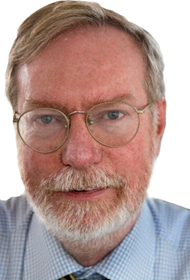
Paul Collier, professor of economics and director of the Centre for the Study of African Economies at the University of Oxford, has accepted an invitation to serve as special advisor to the University of Notre Dame’s Ford Family Program in Human Development Studies and Solidarity.
In his new capacity, Collier will present the lecture “The Plundered Planet and Restoring Natural Order in the Bottom Billion” at 5 p.m. Thursday (Oct. 8) in the Hesburgh Center auditorium on the Notre Dame campus. A reception will precede the lecture at 4:30 p.m. in the Hesburgh Center’s Great Hall. Both events are free and open to the public.
“Paul will strengthen our connections to the scholarly community working on international development and help us to promote the kind of understanding that makes efforts to fight extreme poverty effective and sustainable,” said Rev. Robert Dowd, C.S.C., Ford Program director.
As special advisor to the Ford Program, Collier will assist the program’s leadership in identifying opportunities for innovative research on the causes of extreme poverty. Collier’s experience and expertise will help guide the young program toward its goal of building a transnational and interdisciplinary alliance of scholars, students, public servants and conscientious citizens to address critical challenges confronted by those living in extreme poverty.
“Paul’s research and service are motivated by deep respect for the inherent dignity of the human person and, because this a core value at Notre Dame, we are extremely happy that Paul has joined us as special advisor,” Father Dowd said.
A former director of the development research group at the World Bank, Collier has served as the senior advisor to former British Prime Minister Tony Blair’s Commission on Africa. He studies the causes and consequences of civil war, the effects of aid, and problems of democracy in low-income and natural-resource-rich societies.
Collier is well known for his best-selling book “The Bottom Billion: Why the Poorest Countries Are Failing and What Can Be Done About It.” His newest book, “Wars, Guns, and Votes: Democracy in Dangerous Places,” explores the intersection of democracy and conflict in poor countries.
Collier’s lecture is cosponsored by Notre Dame’s Kellogg Institute for International Studies, the Kroc Institute for International Peace Studies, and the Gigot Center for Entrepreneurial Studies.
A component of the Kellogg Institute for International Studies, the Ford Program advances knowledge on international development by supporting research, teaching and learning opportunities for Notre Dame students and faculty and by collaborating with partner universities. It works with local communities in Africa to apply research results to the design and implementation of innovative solutions that expand opportunities for those trapped in poverty.
Contacts: Elizabeth Rankin, writer/editor, Kellogg Institute, 574-631-9184, erankin3@nd.edu; Tony Pohlen, assistant director, Ford Program, 574-631-7022, apohlen@nd.edu